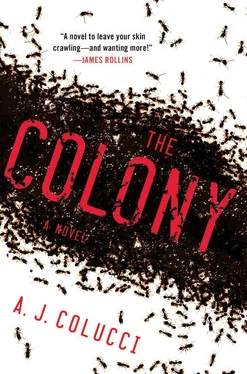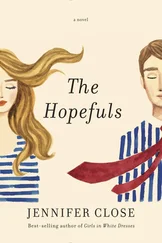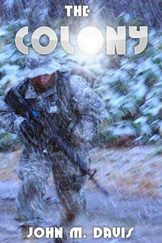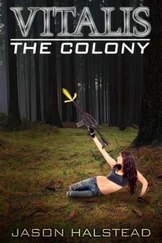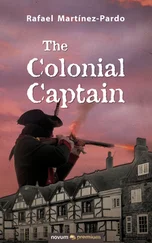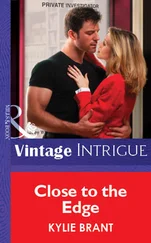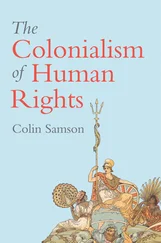Below, the entire floor of the garden moved like a graceful undulating sea. Black armor gleamed in the moonlight. Then all at once, the armies began breaking up into geometric shapes that seemed to shrivel in size. Jerrol held his breath with a last bit of emotion as the puddles seeped into the ground. Then the remaining invaders crawled off his own body and fled toward the door. The ants were leaving.
The baby wailed as her father slowly twisted to face the door. He took two wobbly steps, sweating profusely from a 110 degree temperature. Then his eyes swelled shut, his head snapped back and he coughed up a spray of blood.
Jerrol fell to his knees, and then to the floor.
THE LAW OFFICES OF Dugan, Weiss and Kellogg were in an old Gothic-style building a block from Wall and Broadway, right behind Trinity Church, where Alexander Hamilton is buried. The whole area smelled of money. At four o’clock in the morning the head paralegal was still poring over black folders marked Confidential.
The firm was preparing for a big case. A drug company had recently disclosed that its fat-eating pill was also a pancreas-eating pill. She pressed her palms to her eyes in quiet meditation, when a low wolf whistle startled her nerves. In the doorway stood the most attractive and most despised lawyer in the firm.
“Still here? Lucille, you’re a goddamned paralegal,” he quipped.
“With any luck, I’ll be your boss in three years.”
“I could get you there sooner, sweetheart.”
“Don’t make me sue your ass.”
“You’d lose.”
Lucille leaned back as the lawyer sat down on the desk, trying to catch a better view down her blouse. It made her skin crawl, the way his lips pursed, a gesture he obviously thought sexy but she found effeminate.
“I heard the Central Park couple died last night.”
“The ant people?” she scoffed. “Next time don’t get naked in the middle of Sheep Meadow.”
“You know a better place?” His hands pressed against the sturdy Formica. “I’m a desk man myself.”
“Is that why they call you pencil prick?”
“First the couple in Soho, and now these two in the park. That makes four dead bodies.” He leaned in close, smelling like green Tic Tacs. “Lonely walk to the bus, babe. Bet you could use a ride home.”
“I’ll take my chances with the bugs.”
He shrugged and straightened his tie. Then he left her office with a childish grin, humming “The Ants Go Marching.”
Lucille closed the last folder and reworked her hands across her heavy lids.
Four dead bodies… Four dead bodies… Four dead—
If she hurried, she could still catch the 4:15 A.M. bus to Brooklyn. She grabbed her vinyl briefcase and walked down the hall to the elevator, rode it twenty flights to the lobby, where the security guard was immersed in a crossword puzzle. She took the usual exit, through a side door into an alleyway, an eerie precolonial road paved in original cobblestone that narrowed under the shadows of looming black buildings.
The predawn cool air revived her senses but not her nerve; the alley was silent except for her spiky heels, which struck against the glistening black pavers.
Click, click, click.
Lucille began walking faster and a damp chill spread across her skin. The sound of her own panting quickened her pace, and she clutched the briefcase like a shield.
Four dead bodies… Four dead bodies… Four dead—
Her heel caught the edge of a stone and she stumbled onto her hands and knees. That’s when her thumb touched something wet and furry. A rat. It was nearly devoid of flesh but its round eyes glowed pink and its tiny paw twitched. Lucille stared in terror at the carcass on the shiny black pavers that seemed to come alive with fluttery movements.
She sprang to her feet, grabbing her briefcase and flailing her arms with a guttural cry. Halfway down the alley, she broke into a frantic run, heading toward the hazy light at the end of the lane.
Broadway opened up wide and bright and Lucille stopped, spilling over herself. A few early commuters emerged from the subway, men and women in dark suits toting briefcases. The lights flickered on in the Starbucks across the street and the illuminated banks on Wall Street loomed with noble grace.
Lucille dropped her shoulders with relief and continued down Broadway. The glass shelter at the bus stop was empty and her watch read 4:17, but she stood beside the bench and waited, hoping the bus was running late.
A sanitation truck was parked with its engines still running, the front doors open wide. The dome light revealed an empty cabin. Lucille stepped along the curb and gave the truck a sideways glance. A sound made her turn around, where trash was piled high against a building. Slabs of drywall leaned against the brick and garbage was scattered oddly across the sidewalk.
A faint and unfamiliar noise emanated from the heap, like the crackling of a wood fire. Lucille pulled out a canister of Mace from her briefcase, rolling it nervously in her palm. She moved under the soft yellow glow of a streetlight and in her peripheral vision, something moved.
It was a hand; large and pallid and sticking out behind a board of drywall. The hand twitched. Lucille’s heart caught in her throat.
“Hello? Are you all right?” she asked in a meek voice, and continued in measured steps until the hand was close enough to grab her ankle. There was a slight tremble to her fingers as they extended toward the drywall and gingerly touched the jagged edge.
Whooosh. The drywell fell solidly to the ground and the woman sprang from its reach as shards of ice ripped through her veins. She muffled a cry with her fist.
Two sanitation men lay at her feet, covered head to waist with crawling ants. As light swept their bodies, the insects scurried into the collars and sleeves of their uniforms and vanished under debris. Parts of the men were eaten away, their faces swollen and pale like rising dough. Globs of coagulated blood protruded from their eyes, ears, mouths, nostrils and long jagged cracks in their skin, as if something inside their head had burst into pieces.
Lucille screamed as the number 12 bus pulled to the curb.
IN THE BASEMENT LEVEL of the American Museum of Natural History, a couple hundred of the world’s most brilliant minds studied biology, geology, anthropology, paleontology and every other “ology” in natural science. Along with cutting-edge equipment were mummified bodies, primitive tools, Jurassic-age insects trapped in amber, fossilized bacteria and six-ton pallets stacked to the ceiling with the oldest artifacts known to mankind.
The largest corner office was a relic itself. Under murky light, strained wooden bookshelves were packed with dusty back issues of Entomology Today and Naturalist magazines, faded reference books and journals. A mammoth desk against the back wall was littered with travel brochures of South America, old anatomy reports, draft copies of speeches and uncashed checks totaling ninety thousand dollars in speaking fees.
The office belonged to Dr. Paul O’Keefe, a tall and elegantly handsome scientist in an Armani suit, who had spent the last thirty-six hours tirelessly peering into a microscope. He had a bookish quality, thoughtful and serious, with quick brown eyes that brightened whenever they hit upon something he’d never seen before, which lately seemed to be every few minutes. Paul wiped the back of his wrist over his damp brow and peered through the lens at the absurdly oversized ant with a degree of respect that was turning into something more like terror each day. He adjusted the steel knob and his fingers shook the image.
Читать дальше
